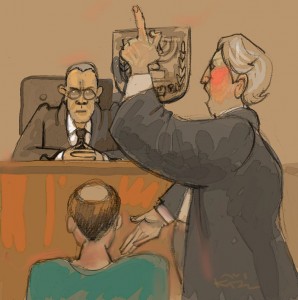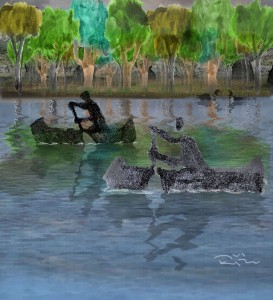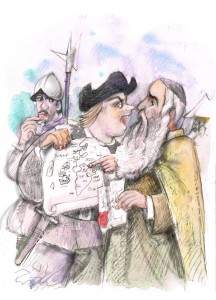Haim Watzman

drawing by Avi Katz
“It’s the piano.” Karin shivered. The music had woken her from an unremembered nightmare. “Someone is playing the piano.”
Or one-eyed her from under his pillow. His muffled voice sounded like it was reaching her from a cave below the floor.
“Call the police.”
“
My piano,” Karin said. “Someone is playing my piano.” She raised herself on her elbows, felt a creak in her lower back, and looked down on her research assistant.
Or turned over on his side so that he could use both eyes. “That’s impossible. There are two of us in the apartment. Of the two of us, only you know how to play the piano. And you are here. Ergo, no one is playing the piano.”
An arpeggio sounded in the treble, and was then taken up by the bass.
“That is,” Or suggested, “unless a burglar, about to climb the basement window with his loot, was seized by an irresistible desire to play … what is he playing?”
[Read more →]
Tags: ghost story·Israeli fiction·Jerusalem story·Schumann·Talbiyeh
June 28th, 2014 by Gershom Gorenberg · Politics and Policy
In a region already in flames, a Palestinian terror attack and Netanyahu’s response could light another fire
My latest column is up at The American Prospect
Gershom Gorenberg
Life in Israel in recent months has been preternaturally tranquil, as long as you keep no more than a quarter of an ear on the news. Jerusalem cafés are packed. If you take a summer hike in the Galilee, nothing in the mountain breeze reminds you that a few dozen kilometers to the east is a failed state called Syria, where a war of all against all has driven nearly half the population from their homes, or that the realm of chaos extends all the way through Iraq.
For that matter, the land on the other side of Israel’s northern border is best described as Hezbollah territory, even if maps show a state called Lebanon there. Across the border in the south, the Sinai is a battleground between jihadist rebels and the Egyptian government. Jordan is still a functioning state—unless the fighting in Iraq and Syria spills over its borders. Feeling calm in Israel is like sipping lemonade in your living room while your neighborhood is in flames.
In truth, Israelis have actually had their ears entirely, obsessively on the news since the kidnapping of three teenage Israeli hitchhikers in the West Bank two weeks ago. The greeting, “Is there news?” means, “Have they been found? Are they alive? ” While the Shin Bet security service released the names of two suspects yesterday, which it identified as known members of the military wing of Hamas, the Palestinian Islamic movement, neither they nor the victims have been located. What’s clear is that the both kidnapping itself and the Israeli government’s reaction threaten to bring the fire much closer to home. [Read more →]
Tags:
Haim Watzman
Your honor, I realize that it is irregular that counsel for a member of the courtroom audience approach the bench. But I hope that you will hold your peace and allow me, before you hand down the sentences of the men and women convicted in the Holyland case, to present my client’s plea.

illustration by Avi Katz
My client—this is he, sitting here in the front row, the one with the funny nose, no, he’s not in a coma, that’s just his way of displaying interest—is a man of modest means, a freelance writer whose words have quickened the hearts of a handful of readers around the globe. He’s a family man, devoted to his community and his country, the salt of the earth, as we like to say. Unlike the movers and shakers who sit in the dock before you, Haim Watzman is barely known to anyone of importance. Like millions of other Israeli citizens, he labors long hours silently, without wealth and fame. And he has come here to ask, Judge Rosen, why he, too, should not be provided with room and board by the state for the next several years.
Has he committed a crime? No, he has committed no crime—because Israeli society has given him no opportunity to do so. Had he been born into wealth, he might have used it to corrupt one of our leaders. Had he been appointed to a position of power, he might have used his influence for personal gain. Never having been invested with the public trust, he was barred from violating it.
I ask you, your honor, is this fair?
[Read more →]
Tags: corruption·courtroom drama·Holyland·Israeli political satire·Olmert
Gershom Gorenberg
My apology to readers; I’ve been mostly absent from this blog while teaching for a semester at Columbia University. But I’m back, and here’s my latest piece from The American Prospect:
“The Vatican treats this as a pilgrimage. We consider it a pilgrimage it with political implications.” So a Palestinian official involved in negotiating the precise form of Pope Francis’s visit to the Holy Land told me yesterday. The comment, though, could as easily have come from an Israeli government source.
The pope’s two hosts agreed on this much and no more: His pilgrimage, so carefully choreographed that even the spontaneous moments were planned in advance, sparkled with symbolism. The battle was over determining what the symbolic journey would stand for. The Palestinians won: They largely succeeded in making Francis’s visit part of their campaign for statehood through international recognition. And yet, both the pope and the Palestinian strategy are subject to the same question: How much does symbolism really count for?
The Vatican itself—not the Israelis or Palestinians—initiated the visit, and in the Vatican’s narrative, it was a peace mission within an entirely Christian context: The pope came to meet Greek Orthodox Patriarch Bartholomew of Constantinople and to commemorate the breakthrough religious summit 50 years ago in Jerusalem between Pope Paul VI and Patriarch Athenagoras of Constantinople.
So this trip was, in theory, the Vatican’s show. The Holy See laid out the program it wanted, Israeli and Palestinian sources told me. But even when it drew up plans, it had to maneuver within the protocol each side expected for a head of state. Then it negotiated for months with the two governments on the details. Pope Francis was the star, and made choices—but often between pieces of pre-written scripts.
The Palestinians won their first victory in March, when the Vatican announced the official itinerary. “The Holy Father will visit three countries: Jordan, the State of Palestine, and Israel,” it said. He’d fly by helicopter directly from Amman to Bethlehem, rather than arriving via Israel, and proceed immediately to a “courtesy meeting with the president of Palestine,” Mahmud Abbas. The symbolic statement was this: The pope would not be visiting the occupied West Bank, certainly not Judea and Samaria (as Israel officially labels the territory), but independent Palestine. This, presumably, was the pope’s choice – but given Abbas’s ongoing diplomatic efforts for recognition of Palestinian statehood, the Vatican couldn’t evade a decision on whether to use that wording. …
Read the rest here.
Tags:
Haim Watzman

illustration by Avi Katz
The picture I see each morning when I turn on my computer is of my younger son, Niot, in a graveyard. His hands are on his hips, his head is cocked, his eyes look straight at me, and his lips are pressed into a half-smile that says, “What, you again?” He’s wearing a gray coat, striped on the shoulders with the straps of a red backpack. Under the coat is a blue Adidas sweatshirt and on his head is an indescribable hat, which perhaps has something to do with a defunct Polish yeshiva. The cemetery is in Poland, and the photograph was taken during his high school class trip to the concentration camps. Now he’s in another cemetery.
I didn’t miss him then. It was a time when I never missed any of my children. That is, I missed them in the sense that I enjoyed when they were home and wondered how they were doing when they were not, but I never felt that they were out of reach, that I desperately needed to talk to or touch them; I never feared that they would not come back. No longer, because Niot went away and didn’t.
When a child dies, he becomes incessantly present. Niot is always in my thoughts, all the time, and not in the back as he was when he was off at school or in the army. He’s always looking at me and asking, “What, you again?”
He’s close up in my mind, and right there on my computer screen, but so distant. As of the Shabbat in the middle of Pesach it’s three years now, and he grips my heart but recedes; I hold him tight but he is ever more distant.
Niot connected with friends and basketballs, not with poetry, but I often think of poetry when I think of him. Right now it’s a poem by one of my favorite living American poets, Sharon Dolin, and it’s called “The Problem of Desertion.” That’s the title, but it’s also the first line, because after it the poem goes like this:
occurs when time feels like space
and the dead are stuck
on shore
As if time were something you have to push your way through. But am I not the one on shore, the one who stayed behind when Niot went off to Poland, when he went off to Golani, when he went off to Eilat and down into the Red Sea and never came back? [Read more →]
Tags: mourning·Niot·Sharon Dolin·Yom HaZikaron
Haim Watzman
“You never play your flute anymore.”
Yael and Aharon squeezed into a corner of the standing area by the rear door of the 34 bus, which smelled of exhaust and wet ponchos. Until last week they had gone down to Ben-Zakkai each Sunday and Wednesday to get the 4 alef to Mt. Scopus but now there was this new line that went to the university from Pierre Koenig Street, closer to home. The people were not the ones they were used to seeing. Bracing himself against the handrail as the bus made a sharp right onto Emek Refa’im, Aharon unshouldered his backpack and opened the zipper, removing a damp copy of an article called “Identity and Freedom” by Amartya Sen, which he should have read over the weekend. The floor was too soaked to put the backpack down and the space too cramped for him to get the straps back over his shoulder, so he wedged it between his back and the window and leaned against it.

illustration by Avi Katz
“You never play the flute anymore,” Yael repeated, looking out at the rain.
The murkiness of the storm-clouded morning was broken by a lightning flash. Yael grabbed his wrist and the article fell to the floor. He cursed under his breath and, apologizing at each stage of descent as he bent down and pushed against the government workers, high schoolers, and nurses who stood around him, picked up the stapled papers, now stained dark with grimy water from umbrellas and boots. The thunder sounded and Yael grabbed his wrist again and put her head on his soggy shoulder.
“Were you talking to me?”
[Read more →]
Tags: Amartya Sen·Egged·Israeli fiction·Jerusalem story
March 22nd, 2014 by Haim Watzman · Culture and Ideas
Haim Watzman
Ornan was staring at his locker and muttering under his breath when I tossed my backpack onto the bench and felt for my keys in my pocket. I’ve had a bottom locker for years at the Jerusalem Pool, hard to see into but easy to pull my gear out of. He first showed up maybe a year and a half ago, when he was assigned a box in the middle-row to my right. He was tall and bony, with shiny, straight, dark hair that smelled of Head and Shoulders. A student, maybe, or just out of the army, from the look of him. He wore baggy trunks and swam badly, at least as far as style goes, raising his head out of the water each time his left hand swung up, splashing the surface with his palms. But, despite all my care with my stroke, he was much faster than I was. In the end, length and leanness of body wins out.

illustration by Avi Katz
It was hard for me to make out what he was muttering because I just then had a coughing fit. Some virus got me last week and whenever that happens I cough for two or three weeks after I get better. Even after I caught my breath I didn’t try to listen because Asher and Alfi, the two cab drivers who dress on the bench behind me, were joshing about a dispatcher. I like to listen to their banter. Ornan just stood there, not making a move to open his locker. Asher and Alfi went out to the sauna and by that time I was suited up and hanging my shirt up on one of the hooks on the wall. Over the heating system that filled the locker room with mildew air, I could make out Ornan’s voice: “I’ll kill him, I’ll murder him, I’ll stick a knife in his chest and slice down to his balls.” It seemed so out of character that I couldn’t help staring at him in surprise. He looked back and kept on muttering.
[Read more →]
Tags: Israeli fiction·Jerusalem Pool·short story
February 10th, 2014 by Haim Watzman · Culture and Ideas
Haim Watzman
April 15, 1492
To her most royal Catholic highness, Isabella, Queen of Castille and Leon:
The Genoan madman who bears this letter assured me that he will be received into your august presence this very week. Knowing, as I do, how intelligent you are and how efficient you always have been in acquitting your duties as sovereign, I cannot give much credence to the claims of this man whose breath smells of sausage and whose speech consists mostly of arm-waving. But at this point I am desperate and have no other prospect for conveying a message to court.

illustration by Avi Katz
I perhaps may take credit for teaching you to first read the second paragraph of every document as a way of deciding whether it is worth your time, so let me get to the point. I have been incarcerated this fortnight in a so-called open detention facility somewhere in Andalusia, on the grounds that I am an illegal infiltrator into your majesty’s kingdom.
You may recall that at the end of last month I requested your leave to travel to outlying areas of your realm to ensure that your highness’s taxes are being collected efficiently. Just outside of Toledo I was abducted by a gang of gendarmes claiming to be in Your Majesty’s service. They served me with a warrant for my arrest—which I am sure was fabricated by Her Majesty’s enemies, or perhaps by lackeys of your most royal but not always very sharp husband, who could easily have been tricked into signing a document unread—on the grounds that I reside in Spain illegally.
[Read more →]
Tags: Abravanel·Christopher Columbus·illegal immigrant·Inquisition·Refugees·satire·Spanish Jewry
February 6th, 2014 by Gershom Gorenberg · Politics and Policy
Gershom Gorenberg
… and my latest column is also up @theprospect:
Outside of being celebrities and having Jewish mothers, Benjamin Netanyahu and Scarlett Johansson aren’t usually thought of having a lot in common. But they’ve been displaying another shared quality of late: the ability to act clueless about the suddenly snowballing economic boycott of Israeli settlements.
To be fair, it’s a lot more likely that Netanyahu is the one putting on an act. Johansson sincerely appeared to have little idea about what she was getting into when she agreed to be the straw-sipping poster girl of SodaStream, the Israeli maker of home fizzy-drink devices that produces wares in the industrial park of a West Bank settlement. “I never intended on being the face of any social or political movement… or stance,” she said in a press statement responding to criticism of her role advertising the firm. This sounds painfully naïve: Nothing having to do with Israeli settlements in occupied territory comes packaged without a political stance, but Johansson may have noticed this only after the ink was dry on the contract. Politics isn’t her profession.
It is Netanyahu’s trade, though. So when he responded to a comment by John Kerry as if the secretary of state had personally threatened Israel with economic sanctions, either Netanyahu knew better or he should have. [Read more →]
Tags:
Gershom Gorenberg
My review of John Judis’s “Genesis: Truman, American Jews, and the Origins of the Arab/Israeli Conflict” is now online at The American Prospect:
On May 12, 1948, President Harry Truman convened a tense Oval Office meeting. In less than three days, Britain would leave Palestine, where civil war already raged between Jews and Arabs. Clark Clifford, Truman’s special counsel, argued the position of American Zionist organizations and Democratic politicians: The president should announce that he would recognize a Jewish state even before it was established. Secretary of State George Marshall was incensed. “I don’t even know why Clifford is here,” Marshall said. “He is a domestic advisor, and this is a foreign policy matter.”
Marshall was asking for an impossible division. Foreign policy and domestic politics can’t be kept apart in a democracy, nor should they be. But this incident, described in John Judis’s Genesis: Truman, American Jews, and the Origins of the Arab/Israeli Conflict, shows that the question of whether U.S. policy toward Israel is captive to a special-interest group has existed even longer than Israel has. [Read more →]
Tags:
January 10th, 2014 by Gershom Gorenberg · Politics and Policy
Gershom Gorenberg
My new column is up at The American Prospect:
On Sunday morning it seemed that Israeli scientists, or perhaps John Kerry, had learned how to do personality transplants. The first operation was reserved for Foreign Minister Avigdor Lieberman, heretofore the growling voice of unreconstructed Israeli ultra-nationalism.
“I want to express my true appreciation of the efforts of Secretary of State John Kerry, who works day and night … to bring an end to the conflict between us and the Palestinians,” Lieberman told a conference of Israeli ambassadors who were home from posts around the world. Kerry’s positions on a peace agreement, Lieberman added, were better than “any alternative proposal that Israel will receive from the international community.”
Two days earlier, Lieberman had met with Kerry and issued an upbeat statement declaring that the American-brokered negotiations “must continue.” Was this the same man who began his first term as foreign minister in 2009 by declaring that the previous round of U.S.-sponsored talks—the ones between former prime minister Ehud Olmert and Palestinian President Mahmud Abbas—were over, dead, and that Israeli concessions would only bring “pressures and more war”? That declaration fit the Lieberman we knew before and set the tone for everything he said after. Had one magical conversation with Kerry transformed him?
Well, not completely, and probably very little at all. In the same conference this week with Israeli diplomats, the foreign minister said that his “basic condition” for supporting an agreement with the Palestinians was an “exchange of territory and population.” This is the Lieberman we know, and his demand is one that Kerry, much less the Palestinians, cannot accept.
There are two ways to understand Lieberman’s sudden change in tone toward peace talks. One reading is that Lieberman is in the first stages of becoming a recovered right-winger—a hawk who finally notices that the status quo of occupation can’t go on….
Read the rest here.
Tags:
December 31st, 2013 by Haim Watzman · Culture and Ideas
Haim Watzman
She laughed and shook her head as she unrolled the clingy plastic from around her slug-shaped sandwich. Down below, raucous teenagers gamboled in a spring that seemed to be the source of the river along which she and her companions had hiked all morning. She laughed at how easy it had been not to think about it, how well her plan had gone. Her companions were no longer visible ahead. Soon they’d wonder about her and send someone back in search. In the meantime, she’d have something to eat.

illustration by Avi Katz
The rains had not yet come, yet the Tzipori River had flowed gently but surely along its terraced channel as they walked beside it that morning. At one point it bowed and nearly circled a low hill on which a tiny village perched. Children played in a schoolyard. The leader had given the village a name that she could no longer remember. Further on was an old millhouse that you could now rent out for weddings and bar mitzvahs. There the trail had crossed the river (all of three meters wide) and she had followed the others over half-submerged stones. The water, which the leader said was partly sewage, washed over her boots. Last to cross, she had probed the riverbed with her poles to steady herself. She thought of turning back but did not.
She hadn’t hiked seriously since her teenage scout years, which were three decades past by now. Back then, at tough spots, like the river crossing, the boys were always ready and eager to help. Some were very serious about it, as if pulling her up a boulder or guiding her over a narrow spot in a path above a canyon was the very reason that they had been placed on this earth. Others had laughed at her fears, in a big-brotherly way (she was the oldest in her family, and had always wanted a big brother). In this group, today, the others were obliging but cool.
She signed up for the hike because she knew it would be good for her.
[Read more →]
Tags: Israel Trail·Israeli fiction













